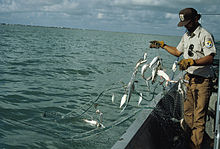EXPLORE OKOBOJI – APRIL 11,2013
The discovery of zebra mussels in some of the Iowa Great Lakes is changing how the Iowa Department of Natural Resources conducts its annual gillnetting operations. Kim Bogenschutz coordinates the aquatic invasive species program for the DNR…(click here for comment.) “We still don’t know how many are in the chain of lakes up there and which lakes they’re all in. Potentially they are not in Spirit Lake yet so as our netting crews are going from lake to lake they’re going to be cleaning and disinfecting their boats in order to make sure that they are not transporting any zebra mussels around with them as well.”
In addition, crews will try an experimental method called dry stripping, in which eggs that are collected from a lake where zebra mussels are present are taken without water to a mussel free location where they are fertilized and incubated. Locally, that will take place at Storm Lake.
Bogenschutz tells KUOO news the DNR will be bringing in eight people beginning in the middle of May and continuing through the summer to assist with boat inspections in the Iowa Great Lakes…(click here for comment) “Four will be working directly for the Department of Natural Resources and four will be Student Conservation Association interns. They will be at the boat ramps like they have been the past few summers or so talking to boaters and anglers about invasive species, all invasive species, not just zebra mussels, and how to prevent their spread and how to clean off their boats and drain their water to make sure they are not spreading things around. And you know we have billboards and will be doing more news releases and we have brochures and maps and things like that trying to get the word out as many ways as we can that there are potentially zebra mussels in there now, but we’ve always been concerned about the spread of Eurasian watermilfoil and Asian carp and everything else as well.”
And now that the ice is out of the Iowa Great Lakes, Bogenschutz says monitoring for additional zebra mussels will be kicking into high gear…(click here for comment) “We’ll be doing three different things: we’ll be taking water samples to look for the villagers which are the baby zebra mussels if you’ll call them, the ones that are microscopic and in the water. Usually we don’t see them until water temperatures are in the fifties, but we will be taking monthly samples from April through September looking for villagers. We will be putting out plate samplers in all of the lakes, multiple samplers in all of the lakes, and these are just structures zebra mussels can settle on. It was actually on one of those plate samplers that the first one was found last year. And then we will also toward the end of summer, if we are seeing some on our samplers or some in the water samples, be doing some surveys of rocks and other hard structures in the area looking to see if there are any adults on those or juveniles settled on those in the summer.”
Bogenschutz encourages anyone who spots a zebra mussel to contact her office at (515) 432-2823 or the fish hatchery in Orleans at 336-1840.
As far as gillnetting operations go, Bogenschutz says it’s her understanding some limited netting took place earlier this week on East Lake Okoboji and that netting on the other lakes will get underway this weekend.

